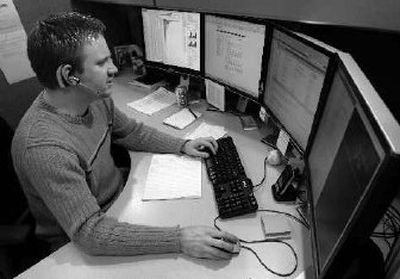New player steps to the plate

KANSAS CITY, Mo. — As the markets dropped sharply last week, sending volume soaring and backing up trades handled by the New York Stock Exchange, at least one stock market player was resting easy.
Bats Trading, an upstart electronic trading system hundreds of miles away in Kansas City, said it handled the volatility with none of the glitches that others experienced.
Bats has quickly become the third-largest stock trader by volume, trailing only the NYSE and Nasdaq Stock Market, thanks to its technology and aggressive pricing. And with new Securities and Exchange Commission regulations designed to ensure that trades are routed to the market that offers the best price, Bats is poised to pull more business away from the NYSE and Nasdaq.
Since founder Dave Cummings set out last year to challenge the two exchanges, volume on his electronic trading platform regularly tops 300 million shares per day, or about 15 percent of what is traded on Nasdaq. Cummings predicts that total will reach one billion shares a day by the end of the year.
Recently, the company began the paperwork to become a legitimate stock exchange, a process that could take several years but would level the regulatory playing field with the NYSE and Nasdaq.
“We’ve just been able to execute our plan,” Cummings said. “We’re very good at being nimble entrepreneurs.”
Cummings is a 37-year-old self-styled “computer geek,” who was born just outside Kansas City. He graduated early from Purdue University with degrees in computer and electrical engineering, then went to work for medical software company Cerner Inc.
In 1995, he ventured into the pits at the Kansas City Board of Trade, where he designed a computer system that would automatically do the work of a pit trader, first trading wheat futures and later stocks.
That computer system evolved into Tradebot Systems Inc., which like Bats is headquartered in Kansas City, but houses its computer systems in a suburb of New York City, close to Wall Street.
Tradebot took advantage of electronic communications networks like Archipelago, INET and Brut to quickly execute trades. Unlike traditional exchanges, which act as intermediaries to connect buyers and sellers, ECNs automatically match buy and sell orders at specified prices.
But over the past couple of years, the NYSE and Nasdaq aggressively bought out the ECNs that offered the greatest competition. Cummings opened his own ECN — Better Alternative Trading System, or Bats Trading — just over a year ago, with Tradebot one of its first customers.
“I like to move very quickly,” Cummings said. “I’m known to be very impatient. I lay out a goal, I break down that goal into steps that can be implemented, and start moving. Pretty soon you’re across the room and you didn’t realize it.”
Cummings hopes to capitalize on the trend toward electronic trading that has already led the NYSE to begin phasing out about 20 percent of its floor space.
The NYSE and Nasdaq aren’t the only stock exchanges facing new competition, though. Seven investment banks are banding together to create a secondary trading platform in Europe called Project Turquoise, which could eventually rival the London Stock Exchange.
But Larry Tabb of The TABB Group, a New York-based consulting firm, said two things have allowed Bats to thrive where others have not.
First, Cummings made arrangements with several major electronic marketing firms like Getco LLC that generate millions of trades without people being involved. That created the volume that attracts other brokers, who can then buy and sell shares more efficiently.
Second, the company has only a couple dozen people in modest offices. Cummings has spent less than $20 million so far.
“If you went to the New York Stock Exchange, they have this imposing structure on Broad and Wall. You go to Bats, they’re on the second floor of a Kansas City strip mall,” Tabb said. “They have a very different cost structure.”